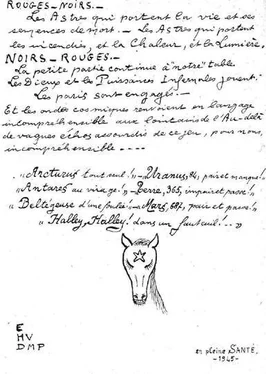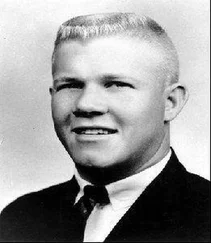Floriot received a standing ovation. The Associated Press Paris correspondent called it “the greatest defense summation in French criminal history.” Indeed, at that moment, it seemed that all the bones in the basement, the bodies half-devoured in the pit of quicklime, and the countless remains pulled out of the Seine were forgotten in a stream of eloquence and applause.
As French law gave the last word to the defendant, Leser asked Petiot if he wanted to add anything. “I cannot … nothing,” he said, emotional again from his lawyer’s closing statement. “You are French. You know that I killed members of the Gestapo. You also know what you have to do.”
THE jury was handed a list of 135 yes-or-no questions, five for each of the twenty-seven alleged victims: “Is the above mentioned, Marcel André Henri Petiot, guilty of having willfully put to death, in Paris or in any other part of France, [insert name]?” Follow-up questions asked if the defendant was guilty of the above “with malice aforethought”? Was this also “accompanied by ambush and confinement”? or “by fraudulent appropriation of property”? Finally, did the defendant commit this voluntary homicide with the “aim of preparing, facilitating or affecting the fraudulent appropriation specified above?” A vote would be taken on each question for each victim. Two-thirds majority vote would suffice for the verdict.
As Leser, the two magistrates, and the members of the jury retired to the chambre des délibérations with the enormous dossier, they would enjoy a catered meal of sauerkraut and wine from a nearby bistro. Few spectators, meanwhile, dared to leave the courtroom, described by the writer Colette, covering the trial for France-Soir , as “suffocating and reeling.” A large crowd waiting outside still hoped for a seat, in case someone made the mistake of visiting the cafeteria without having a friend reserve their place. Some members of the audience pulled sandwiches, dry sausages, and fruit from brown lunch bags; others smoked. In the back, binoculars were brandished.
A guard escorted Petiot into a side room. Three of the “Floriot’s boys” took turns keeping him company. They would discuss everything from oriental carpets to the art of discovering bargains at auctions.
About 11:50 p.m., after two hours and fifteen minutes of deliberation, or roughly one minute per question, which was barely enough time to read the question aloud and vote, let alone debate the issue, the court clerk announced that the jury had reached its verdict. Petiot had already returned to the courtroom, where after signing copies of his book he had fallen asleep. He was awakened.
The jury and the magistrates soon entered the silent room. The clerk of the court read each of the questions. Petiot was found guilty of twenty-six of twenty-seven charges of murder. He was acquitted only in the case of Denise Hotin.
After asking the defendant to stand, Leser read the punishment: Marcel Petiot was sentenced to die on the guillotine.
Petiot looked calm and aloof. Bright flashes from the magnesium cameras popped, rendering his face paler and “hollowing out his sockets,” as Henry Magnan wrote in Le Monde . One gasp was heard at the announcement, some believing it came from Georgette, others suggesting Maurice, Gérard, or perhaps someone unrelated to the defendant. Floriot promised to appeal the verdict.
As Leser announced the sentence, Petiot had looked right at his family. He rubbed his hands together as if washing them and then grinned with rage. Handcuffed again and escorted out of the courtroom by guards, Petiot turned and shouted, “I must be avenged!”
36.
TIMBERS OF JUSTICE
DIVINE JUSTICE IS MY CONSOLATION.
—Georgette Petiot
IN a rare interview on the eve of the trial, Georgette Petiot had told reporters Maurice de Person and Christian Yve of France-Soir that she felt all alone and depressed. “Nothing more can now touch me,” she said. “Public opinion is indifferent to me.” As for her husband, he was innocent of the charges, simply another victim of Nazi propaganda and society’s perpetual need for scandal. Although she and her son could not change the verdict, she was reconciled with its inevitability:
Life is made of many evil and dark hours. But it is also made of hours so beautiful that they can help clear up the dark hours.… And then there is hope. Hope that this life is not an end, but a means. Faith helps bear support at this present moment. Divine justice is my consolation
.
Eleven years after the trial, Georgette Petiot still maintained that her husband was innocent. One day, she said, she would prove it. She was reconstructing the dossier, piece by piece. At her small apartment near Montmartre cemetery, a photograph of Marcel Petiot adorned her dressing table.
Gérard would come to the attention of the French police one brief last time. In February of 1955, an anonymous letter reported that he was trying to sell valuables at a jewelry store on rue Provence. One of the shopkeepers, Léon Schpiglouz, told a detective that he had bought a microscope that had belonged to Dr. Petiot, but never any jewelry or other valuables. He also told police that his family, Jewish émigrés from Russia, had lived at 66 rue Caumartin during the war and Dr. Petiot had approached them several times to encourage them to leave Occupied Paris.
Gérard would eventually move to South America, settling in Rio de Janeiro, where he went into business with a cousin. Georgette, who worked a number of years as a baker, remarried in 1966. Both Georgette and Gérard shunned media and historians alike. They never spoke publicly about Marcel Petiot.
Although few people doubted that Petiot was guilty of taking many lives, it is difficult to argue that he received a fair trial. Trying to sort out the many unanswered questions of each case was a challenge in the best of circumstances, and squeezing all twenty-seven counts of murder into sixteen sessions in the volatile climate of Paris 1946 did not help the prospects for an impartial, informed examination of the evidence. The press, as René Floriot put it, had “cooked the case.” A couple of jurors had given interviews to a reporter, which showed a strong bias against the defendant. Even Président Leser called Petiot a “terrifying monster.” Twenty years after the verdict, one of the jurors confessed that he believed that he had made up his mind too hastily, and he was certain that Petiot did not have a fair trial.
It is also worth asking if the defense should have pleaded insanity. Article 64 of the French Penal Code then stipulated that there was “neither crime nor misdemeanor when the accused was in a state of dementia at the time of action, or if he were constrained by a force which he could not resist.” The problem for Floriot was that Petiot, claiming to be a hero of the Resistance, refused to consider such a plea. Moreover, it is by no means certain that this argument would have persuaded the jury. In his last psychiatric evaluation, completed in December 1944, Petiot was found to suffer from no mental problem whatsoever.
Yet Petiot was no stranger to asylums. By the time he had turned forty, many psychiatrists had diagnosed him with a number of mental problems that rendered him “dangerous to himself and to others.” Some of the early evaluations during World War I seem consistent with posttraumatic stress disorder. There were several reports of his delusions and hallucinations, and at least one diagnosis of dementia praecox, or schizophrenia. Just ten years before his trial, Petiot was diagnosed with cyclothymia, a mild case of manic-depressive psychosis, with feelings of paranoia and persecution. Indeed, right up to the jury deliberations, Petiot was apparently still receiving a pension for his mental disability.
Читать дальше












